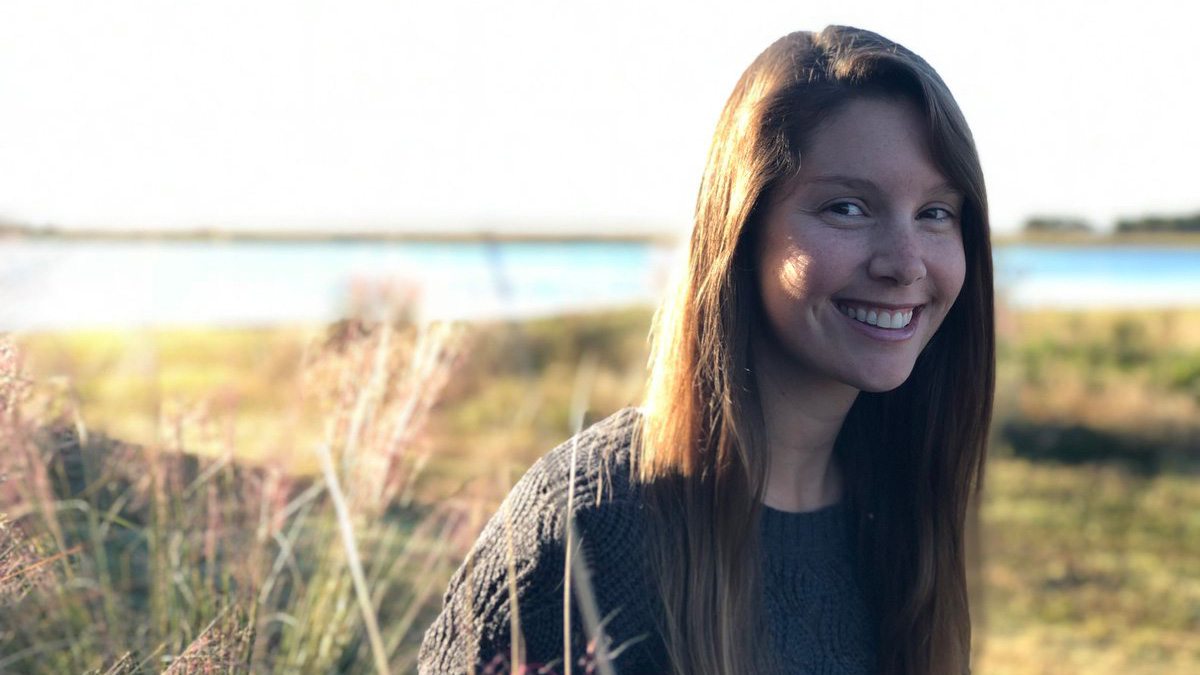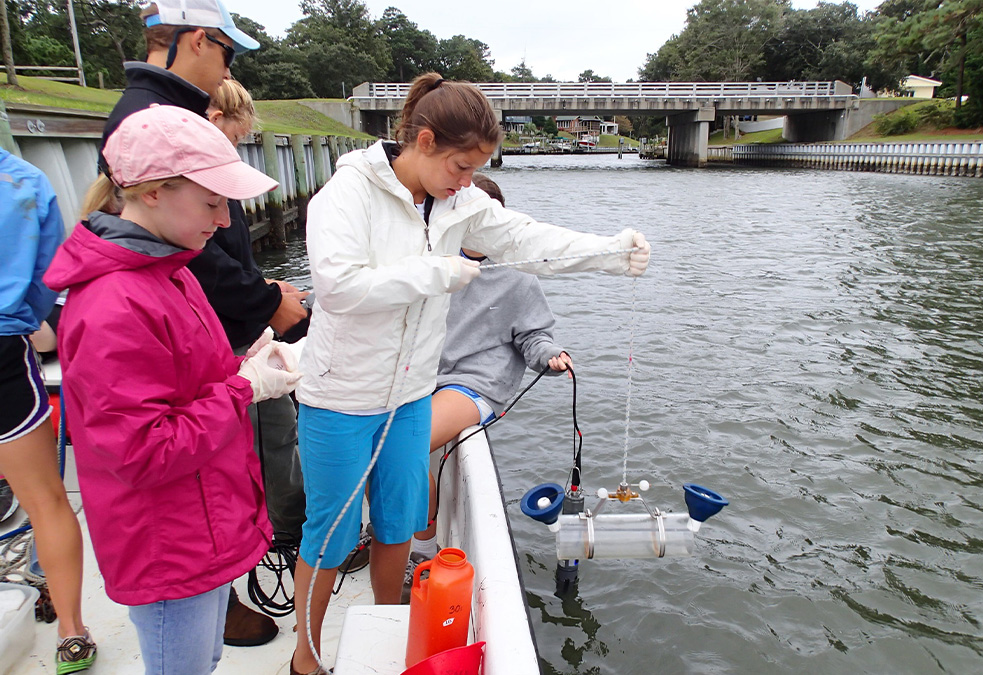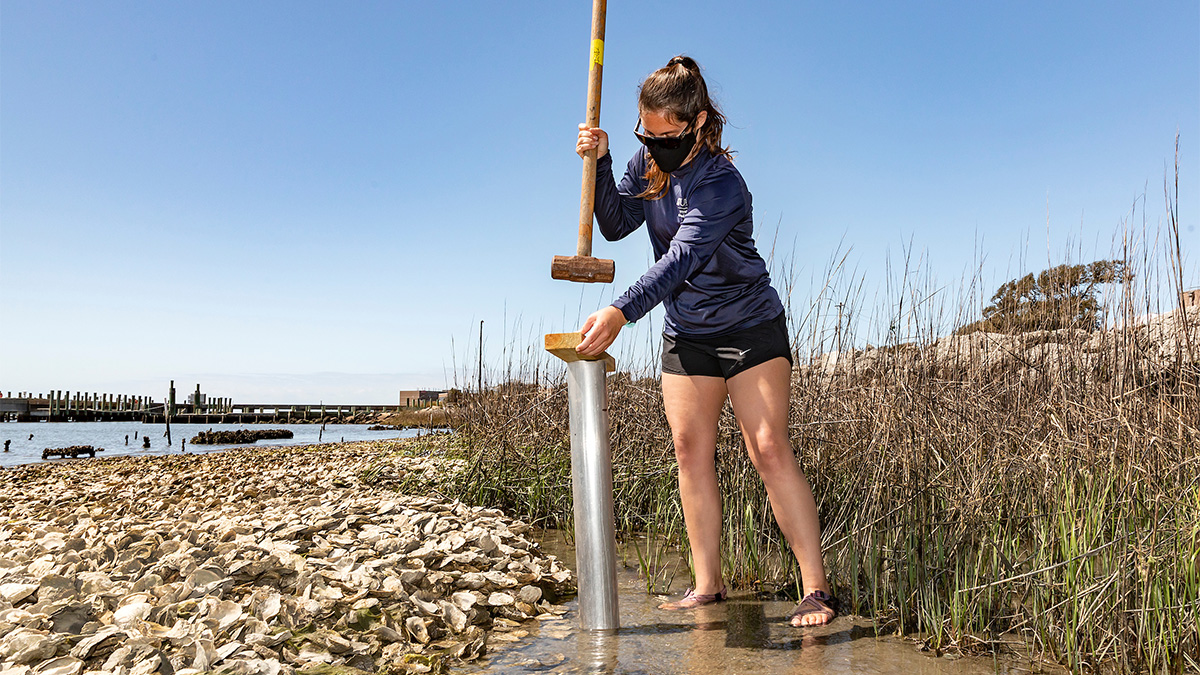Research field site experience sets triple Tar Heel on path for dream career
Molly Bost '13, '16 (MS), '22 (Ph.D.) has always known she wanted to be an environmental scientist. At Carolina, the three-time Tar Heel gained the knowledge and experience to put her passion for North Carolina's coast into action.

Growing up on a salt marsh in Wilmington, North Carolina, Molly Bost has wanted to be an environmental scientist for as long as she can remember.
“I was able to see things like hurricanes impacting my literal backyard,” she said. “I saw my entire community be impacted by things like land-use change, and we had issues with water pollution due to land-use change. We had issues with marsh resilience and beach renourishment. It just became really important to me.”
Her interest may have grown out of necessity because of where she lived, but it was at Carolina where the three-time Tar Heel gained the knowledge and experience to put her passion for North Carolina’s coast into action.
With unique hands-on experiences as an undergrad and mentorship from leading researchers for nearly a decade, Bost ’13, ’16 (MS), ’22 (Ph.D.) was able to launch into her dream career.
A taste of the marine sciences
Bost transferred to UNC-Chapel Hill as a junior to gain more experience in marine sciences. She was particularly interested in the UNC Institute for the Environment’s field site in Morehead City, North Carolina. The program is one of five field sites the Institute for the Environment has established to give undergraduates first-hand field research experience. Students can also study ecology in Highlands, North Carolina; environmental infrastructure in Manteo, North Carolina; sustainability in Chapel Hill; and energy in Thailand.
The Morehead City Field Site gave Bost the opportunity to test out her lifelong career goal.
“From a pretty young age, I had decided the trajectory I wanted to go, and I decided this trajectory without ever really trying it out in any way,” she admitted. “The field site was the perfect opportunity for me to experience what marine science really was and see the day-to-day functioning of a marine scientist to see if that was really something I wanted to do or if I was putting myself into something that I wasn’t as interested in as I thought.”
Bost enrolled in the semester-long program in the fall of her senior year, living in Morehead City while taking classes, conducting an independent study on husbandry and rehabilitation of baby sea turtles, and completing a capstone project focused on water quality in Pine Knoll Shores, North Carolina.

Stephanie Tolar and Molly Bost at the Morehead City Field Site in 2012, collecting water samples from the Pine Knoll Shores Canal as part of the Capstone project. (Photo by A. McKinney)
Working alongside the faculty and researchers at the Institute of Marine Science, Bost began to see herself as a marine scientist, and the hands-on work in the field provided more meaningful experiences that strengthened her interest.
“Every time we got to go out and use a new instrument and bring it back to the lab and look at the data and figure out what it meant, that whole process was exciting for me,” she said. “I really loved doing the capstone project and getting to collaborate with my friends and start a project from the beginning and then make something out of the data. That was a critical thing that I feel like students don’t get to do very much as an undergrad. It’s very representative of what it’s like to be a scientist.”
The experience ultimately helped the Tar Heel home in on what she wanted to do in the field. Marine biology and working with sea turtles, as it turned out, was going to be more of a hobby than a career. Coastal geology was what she wanted to study.
“I became more interested in morphology, sedimentology and geology after that semester, and that kind of led me into my final semester and the kind of research I sought out,” Bost said.
Repeat tours at IMS
Bost graduated with a degree in environmental sciences and became a technician at the Coastal Studies Institute in Wanchese, North Carolina before returning to Carolina to pursue a master’s degree in marine sciences and conduct research in Brent McKee’s lab on main campus to study sedimentology. Her collaborators during her master’s work were at IMS, she visited IMS for field work and became part of the IMS graduate student community.
She decided to become a full-time part of the close-knit IMS community as she worked toward a Ph.D. in marine sciences.
“I really wanted to work with these people at Carolina in North Carolina and continue this North Carolina-focused career that I’ve built for myself,” she said.
As a doctoral student, she worked with Antonio Rodriguez to examine sedimentation in tidal creeks and salt marshes to better understand how land-use changes and coastal development impact watersheds and estuarine systems. Her work led her to study 12 tidal creeks throughout North Carolina — including the one she grew up on in Wilmington.

Molly Bost collects sediment samples on the shoreline as a doctoral student in 2021. (Photo by Johnny Andrews/UNC-Chapel Hill)
Working in her own backyard wasn’t the only full-circle moment she encountered during her graduate studies. As a doctoral student at IMS, Bost became a mentor for cohorts of field site undergraduates.
“I never took that lightly,” she said. “It was easy for us [field site alumni] to see the impact that we were having on the undergrads because we were similarly impacted. We took that role very seriously, and I took that role very seriously as a mentor. We all took the undergrads under our wings.”
Since graduating in 2022, Bost has been working as an estuarine research scientist at the National Oceanic and Atmospheric Administration in Beaufort, North Carolina. At NOAA, she studies how marsh restoration projects like living shorelines up and down the East coast impact carbon cycling.
This is the career she envisioned as a kid growing up on a salt marsh and that she fostered while working in the field as an undergraduate student.
“As a field site student in Morehead City, I remember me and all my close friends talking about how we were all going to come back, be grad students at IMS or Duke and then get jobs at NOAA,” she said. “I wasn’t so arrogant at the time to think it would be easy, and it certainly hasn’t been, but I would say that I’m living the life I wanted to live.
“I really don’t know where I would be without the field site. Everything about my professional career has been centered around the field site and what it did for me.”




